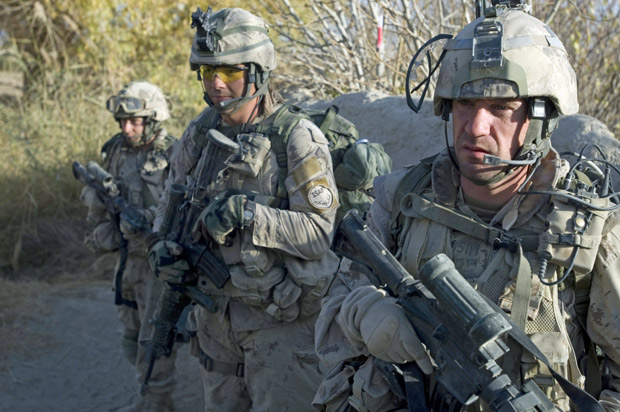ZANGABAD, Afghanistan – The road to Zangabad is lined with graves and for many years was littered with mines, but for Canadian troops it is now memory lane.
The place they fought hard for over so many years, a place they occupied for the first time last fall, was quietly handed over to the Americans on Sunday as the withdrawal of the Canadian army from Kandahar hit full stride.
Alpha Company 1st Battalion Royal 22e Regiment, which rolled into the notorious Taliban redoubt as part of NATO’s major offensive last year, pulled back to Kandahar Airfield as a first step on the long journey home.
"Au revoir, Zangabad," the radio crackled on Sunday morning as the last Canadian light armoured vehicles rolled out the gate of the region’s main forward operating base.
The stubborn little knot of tightly-woven villages has gone by a few nicknames over the years, including "Zangaboom" because of all of the improvised explosives. At one point in 2008, troops could not drive into the area because it was so heavily mined.
It’s also been called "Zanga-not-so-bad" when compared with even wilder communities, such as Mushan to the west.
"There is real a sense of accomplishment," said Maj. Pierre Leroux, the company commander, shortly after the Canadian flag was hauled down at the spartan, sun-drenched forward base that he carved out of an empty field.
The road coming into this hard, angry little corner of Kandahar is in some ways the story of the Canadian mission here.
At the northern edges, near the village of Sperwan, are the cemeteries where the Taliban buried their dead in 2006 following the milestone battle Operation Medusa. It was the main route the insurgents used to escape the grinding NATO offensive.
It was fertile poppy country, where the insurgency draws its financial strength.
Scorched and depopulated by the Soviets in the 1980s, the Taliban found sanctuary among ruined compounds and abandoned farms, turning them into bomb-making factories ready to unleash with deadly precision against Canadian troops.
It was only with the American surge that Canada gained enough strength to be able to overrun the region and stay to build an extension to the road, which the army counts among its legacies.
The commander of the American unit replacing them said the Van Doos kept up the tempo of patrols right to the end – a time when most other soldier might have coasted to the finish line.
"They wanted to go out with a sense of professionalism that was truly inspiring," said Lt.-Col Steve Miller, the soft-spoken leader of 3rd Battalion 21st U.S. Infantry Regiment.
He said he and his men could sense the weight of expectation placed on the Van Doos company, which is among the last Canadian combat units in the field.
The U.S. Stryker unit knows its taking over a tough neighbourhood, one that has been unusually quiet despite being well into the Taliban’s spring-summer fighting season.
Miller’s troops have only faced few if any heavy weapons, such as mortars and roadside bombs, in the increasing number of ambushes being laid to the west and southwest of here, near the border with the Registan desert.
He attributed it to operations conducted by the Canadians last winter, where they uncovered more improvised explosives than at the height of violence last year. The Van Doos also captured a number of prisoners last spring, who were presumably Taliban returning from the winter hiatus in Pakistan.
"I’m surprised it’s not been more kinetic," Miller said reflecting on the number of firefights his men have faced. "Knowing the history of the place, I’m surprised, but who knows what will happen in three weeks."
Canadian commanders say they’ve only received harassing firing from the Taliban, but Miller said there are signs a more determined band of foreign fighters is operating in the area, a group that not only shoots but moves with the skill of trained insurgents.
As the column of Canadian armoured vehicles snaked its way out of the area, NATO attack helicopters unleashed a barrage on a distant field.
A huge column of white smoke rose into the blinding noon day sun, a poignant reminder to the soldiers of the war they’ve left behind.

- High blood pressure drug recalled over low blood pressure pill mix-up
- ‘Doesn’t make sense’: Union files labour complaint over federal 4-day in-office mandate
- Canadian Tire ordered to pay nearly $1.3 million for false advertising
- Ottawa gives Canada Post a $1.01-billion loan amid ongoing financial struggles







Comments